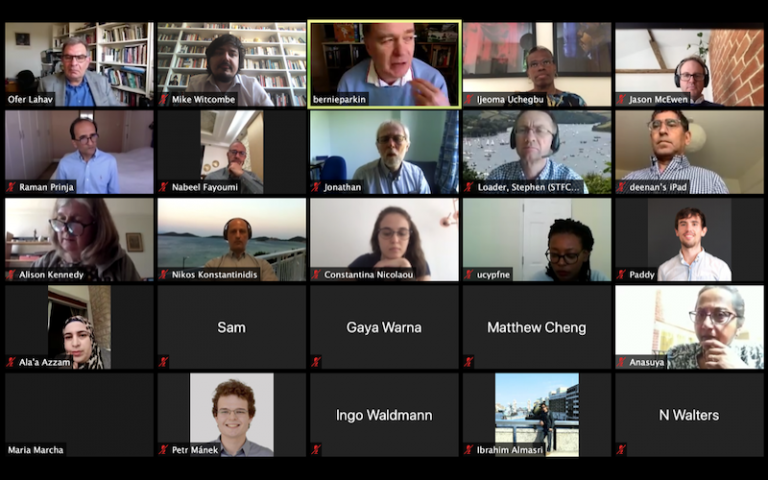The UCL-Jordan Data Intensive Science collaboration extends the successful activities of UCL’s CDT in DIS to help train the next generation of Jordanian data scientists.
The UCL-Jordan Data Intensive Science collaboration is supported by a grant of £300k from the Newton-Khalidi Fund (Newton Fund for capacity building in data intensive science in the Middle-East), and is awarded to a team led by Professor Ofer Lahav, Professor Jonathan Tennyson and others from the Department of Physics and Astronomy and MSSL.
About the Programme
The capacity building programme in Data Intensive Science (DIS) started successfully following launch events in both Amman and London in March 2020, supported by an award from the Newton Fund (part of the UK Government’s Official Development Assistance programme). It supports joint activities between UCL and select Jordanian partners, extending some of the training elements of our Centre for Doctoral Training in Data Intensive Science. Following a grant extension to 2022, this programme will enhance cross-national collaboration through in-person networking and research events.
The Capacity Building DIS project with Jordan enhances the UK’s visibility in AI, and it will open new DIS-related industry opportunities in the Middle East. Building research collaborations with Jordanian partners in a developing academic field will ensure mutual development opportunities, sharing best practice in training methodologies and providing the next generation of UK data scientists with a sense of the global priorities of their chosen area of study. This project is helping to create capacity in the application of artificial intelligence and applying big data techniques. These will be critical in enabling Jordan to apply these advanced techniques to solve development challenges in healthcare, water, agriculture, and the environment.
The programme provides a world-leading training experience, co-created and co-delivered by industry, which will result in highly trained and well-rounded AI-experts, with a truly unique skill-set, who will become future AI-leaders in Jordan in both academia and industry. As such, they will help address the significant national skills shortage in this area, driving forward the Jordanian economy.
Achievements to date
Successes of this programme include:
- About 45 senior BSc and MSc students in Jordan (62% of whom are female) have undertaken advanced training in Machine Learning based on courses pioneered at UCL.
- Jordanian students have worked with their UCL peers on group projects with UK industrial partners, fostering international collaboration and knowledge transfer.
- Jordanian students have become a core part of the CDT, gaining insight into cutting-edge AI and ML research through participation in joint seminars and workshops.
“"Our students could join the Machine Learning course remotely. The course was designed in a very useful way, which made our students manage understanding easily. Also the planned workshops and Remote Tutorials are expected to enhance the students' understanding." Dr Ala’a Azzam, University of Jordan
"For me, this project with Jordan is a ‘real life’ experience of how to continue external engagement in the Covid-19 situation." Professor Ofer Lahav, UCL
Launch Event - April 2020
A launch event for the UCL-Jordan Data Intensive Science (DIS) collaborative programme was held on 24 April 2020. Professor Ofer Lahav, Vice-Dean (International) for MAPS, hosted the event over Zoom. Presenters included Pro-Vice-Provost (International) Deenan Pillay and Pro-Vice-Provost (Africa and Middle East) Ijeoma Uchegbu.
The launch event brought together Jordanian partners from the Royal Scientific Society and the University of Jordan, UCL senior leadership, representatives from the Science and Technology Facilities Council and the British Embassy in Amman, CDT students and other interested parties.

Attendees at the launch event for the Capacity Building Programme, 24th April 2020
 Close
Close

